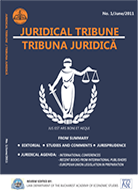Avoidance of international double taxation. Taxation of business profits in Romania
Avoidance of international double taxation. Taxation of business profits in Romania
Author(s): Florin Dumiter, Ștefania Amalia JimonSubject(s): Law, Constitution, Jurisprudence
Published by: Societatea de Stiinte Juridice si Administrative
Keywords: international double taxation; double non – taxation; permanent establishment; corporate profits; OECD Model Convention; state of residence; source state; tax treaty;
Summary/Abstract: In this article we wanted to achieve a comprehensive analysis of corporate profit tax for non-residents, from the standpoint of the issues that it creates on the double taxation of income and capital. Taxing the corporate profits of non-residents is a particularly important aspect in terms of revenue growth, encouraging foreign investment, and strengthening cross-border trade. The “source” state will decide the legitimate right to tax the profits of businesses that operate within its jurisdiction. Tax treaties do not impose limits on these types of taxing rights, other than those stemming from the obligation to impose profits, since the issue of taxation is “satisfied”. Moreover, the source of tax revenue belongs to the source state. Thus, we can see that it is unlikely that the state of residence of a non-resident taxpayer should want to “share” such tax revenue. It can be observed that the state of residence also has the right to tax the profits, but in general it gives credit in respect of taxes of the source state or deducts them for the purpose of preventing the occurrence of double taxation. If the state of residence provides a credit for taxes paid within the source state, taxes which have not been collected and owed to the source state will constitute a tax transfer to the state of residence, from which the taxpayer will not have any benefit. As regards Romania, in terms of the treatment of enterprises, this article represents a real quid pro quo, as it tackles both the international and national taxation of corporate profits, through the provisions found in the new Fiscal Code and the Code of Fiscal Procedure, as well as the new proposals on the taxation of turnover in companies, all of this extrapolated with the new proposals for turnover tax from IT giants. The article ends with the presentation, comment and analysis of a case of international double taxation, more specifically the taxation of corporate profits, a topic of great importance and current interest regarding jurisprudence in Romania, having the aim to observe, mutadis mutandis, the way in which business profits are taxed in practice. The conclusion of this article is intended as a genuine caveat to meet the needs of taxpayers and tax authorities on the need for such measures, both nationally and internationally, in terms of corporate profits, measures that have to take into account the international framework of the contemporary business environment, which is constantly changing and evolving.
Journal: Tribuna Juridică
- Issue Year: 7/2017
- Issue No: 14
- Page Range: 237-250
- Page Count: 14
- Language: English

